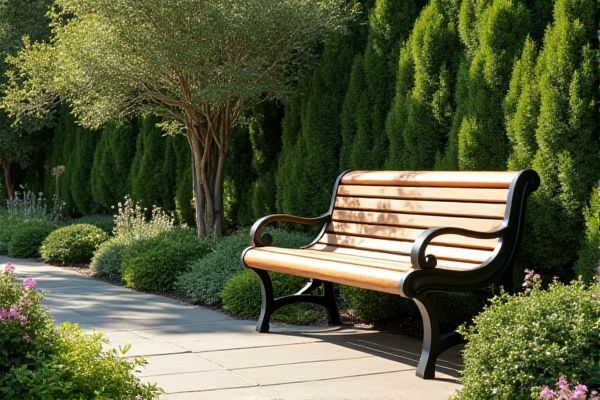
Polywood garden benches offer durable, low-maintenance comfort with resistance to weather and fading, making them ideal for long-lasting outdoor use. Metal benches provide strength and classic style but may require more upkeep to prevent rust and wear; explore this article to find which option best suits Your garden needs.
Table of Comparison
| Feature | Polywood Garden Bench | Metal Garden Bench |
|---|---|---|
| Material | Recycled high-density polyethylene (HDPE) | Steel, aluminum, wrought iron |
| Durability | Resistant to rot, corrosion, and weather damage | Strong but prone to rust without treatment |
| Maintenance | Low - requires occasional cleaning with soap and water | Medium - needs periodic rust protection and repainting |
| Weight | Light to moderate, easy to move | Heavier, often requires two people to relocate |
| Comfort | Smooth, warm surface; ergonomic designs available | Can be cold and hard; often requires cushions |
| Environmental Impact | Eco-friendly, made from recycled plastic | Less eco-friendly, involves metal mining and processing |
| Cost | Moderate to high depending on design | Varies from moderate to high depending on metal type |
| Aesthetic | Modern, clean lines; available in multiple colors | Classic, vintage, or ornate styles |
Introduction to Polywood and Metal Garden Benches
Polywood garden benches are crafted from high-density polyethylene lumber made from recycled plastics, offering durability, weather resistance, and low maintenance compared to traditional materials. Metal garden benches, typically constructed from wrought iron, aluminum, or steel, provide sturdy support and classic aesthetic appeal but may require regular upkeep to prevent rust and corrosion. Both materials offer distinct advantages, with Polywood benches excelling in environmental sustainability and longevity, while metal benches boast strength and timeless design.
Material Composition and Durability
Polywood garden benches are crafted from high-density polyethylene, a recycled plastic that resists moisture, rot, and insects, ensuring long-lasting durability without requiring frequent maintenance. Metal benches, typically made from steel or aluminum, offer strength and stability but may be prone to rust and corrosion over time if not properly coated or treated. Your choice between polywood and metal depends on prioritizing weather resistance and low upkeep versus traditional strength and potential for refinishing.
Weather Resistance and Maintenance
Polywood garden benches excel in weather resistance, as their high-density polyethylene construction resists moisture, UV rays, and temperature fluctuations without cracking or fading. Metal benches, often made from aluminum or wrought iron, may require protective coatings to prevent rust and corrosion in humid or rainy environments. Maintenance for polywood involves simple cleaning with soap and water, whereas metal benches might need regular repainting or rust treatment to maintain their appearance and durability.
Comfort and Ergonomics
Polywood garden benches offer superior comfort with their smooth, contoured surfaces that reduce pressure points, unlike many metal benches that can feel hard and cold. The thermal properties of Polywood prevent heat retention, ensuring a comfortable seating experience in both hot and cold weather. Your relaxation is enhanced by Polywood's ergonomic design, which often includes built-in lumbar support absent in most metal bench models.
Aesthetic Appeal and Style Options
Polywood garden benches offer a wide range of color options and mimic the natural look of wood while requiring minimal maintenance, enhancing your outdoor space with rustic charm. Metal benches provide sleek, modern, or ornate designs that can withstand various weather conditions, offering durability alongside bold stylistic statements. Both materials allow customization for different aesthetics, but polyester benches often appeal to those wanting classic warmth, while metal suits minimalist or industrial garden themes.
Environmental Impact and Sustainability
Polywood garden benches are crafted from recycled plastic lumber, significantly reducing waste and promoting sustainability by preventing plastic from entering landfills or oceans. Metal benches, while durable and often recyclable, generally require energy-intensive mining and manufacturing processes that contribute to higher carbon emissions. Choosing a Polywood bench supports eco-friendly outdoor furniture options that align with your environmental values.
Weight, Portability, and Assembly
Polywood garden benches are lightweight and easy to move, making them highly portable compared to heavier metal benches. Metal benches tend to be more durable but require extra effort during assembly due to heavier components and the need for secure fastenings. Polywood's simpler assembly process often requires minimal tools, enabling quick setup and repositioning in outdoor spaces.
Cost Comparison and Value for Money
Polywood garden benches generally cost more upfront than metal benches but offer superior durability and low maintenance, making them a cost-effective long-term investment. Metal benches are typically cheaper initially but may require frequent upkeep like repainting or rust treatment, which adds to overall expenses. Evaluating total lifecycle costs shows Polywood benches provide better value for money due to their resistance to weather, fading, and decay.
Best Uses and Placement Recommendations
Polywood garden benches excel in coastal and humid environments due to their weather-resistant, low-maintenance composite material, making them ideal for patios, poolside areas, or garden corners where durability and comfort are priorities. Metal benches, often crafted from wrought iron or aluminum, suit traditional gardens or urban parks, offering sturdy support and classic aesthetics but requiring regular maintenance to prevent rust in wet conditions. Choosing between the two depends on Your desired placement: opt for Polywood in moisture-prone areas and metal benches where style and structural strength in drier settings are essential.
Conclusion: Choosing the Right Garden Bench
Polywood garden benches offer durability, weather resistance, and low maintenance, making them ideal for outdoor use in various climates. Metal garden benches provide a classic aesthetic with strong structural integrity but may require regular upkeep to prevent rust and wear. Selecting the right garden bench depends on balancing desired style, environmental exposure, and maintenance preferences.
 homyna.com
homyna.com